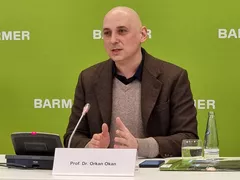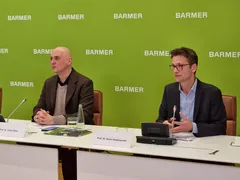More than half of all students between the ages of nine and 18 consider themselves to have poor digital health literacy. The picture is only slightly better among their teachers. 42 percent of them consider themselves to be insufficiently equipped to obtain and deal with health information on the internet. This is the result of studies conducted by the Assistant Professorship of Health Literacy, headed by Prof. Dr. Orkan Okan, and the Hochschule Fulda University of Applied Sciences in cooperation with the health insurance company Barmer. Such deficits are to be reduced by the prevention project "Durchblickt! - Digital in eine gesunde Zukunft" prevention project.
The first results were presented yesterday, 27.04.2023 in Berlin, at a press conference. In addition to Prof. Okan, Prof. Dr. med. Christoph Straub, Chairman of the Board of Barmer Gesundheitskasse, which is funding the project with 1,000,000 euros, and Prof. Dr. Kevin Dadaczynski from Fulda University of Applied Sciences took part. "The project examines digital health literacy in schools for the first time and sharpens the focus on the needs of students and teachers. The results of the study will be transferred into target group-oriented prevention measures for strengthening digital health literacy in schools," Prof. Okan explains the relevance of the project.
Digitalisation is a major challenge for health in childhood and adolescence. Promoted by the internet, social media and smartphone apps, the points of contact of adolescents with health information are constantly increasing. The results of a representative survey are particularly sobering. More than half of all pupils (52.9 percent) have only limited digital health literacy - with the Free State of Bavaria bringing up the rear. 61.8 per cent of pupils show deficits here.
There are no differences according to gender, migration or type of school, but there are differences in age. Here, digital health literacy is visibly increasing. However, the results with regard to socio-economic status are alarming. Students from families with a low level of affluence have low digital health literacy more often than their peers of the same age. Thus, digital health literacy in childhood and adolescence follows a "social gradient", Okan explains.
Around 1,450 students and almost 1,200 teachers were surveyed for the study nationwide. The adolescents indicated particular difficulties with the topic of personal data: "Pupils are obviously too careless with their own data. This can not only get them into trouble socially. It may also have health consequences. For example, if they become victims of cyber-bullying," explains the health scientist from the Department of Sport and Health Sciences.
The aim of the project is to promote the holistic approach and to strengthen the health literacy of students, their parents as well as teachers with practical teaching material on diverse digital topics. This also has a direct impact on well-being: "Digital health literacy helps determine whether we live healthy lives, avoid risks to health and strengthen behaviours that are good for health," says Prof. Straub from Barmer.
"In the coming years, it will be important to make health literacy a central topic of health education in schools, to qualify teachers in the field of health literacy through training and further education, and to develop schools into health-competent settings," says Prof. Okan, looking optimistically to the future.
To the homepage of the prevention programme "Durchblickt! - Digital in eine gesunde Zukunft
To the homepage of the Professorship for Health Literacy
Link to the press conference "Digital health literacy: Are schools fit for online health?
To the overview Digital health literacy - project brings prevention into the school environment
Contact:
Prof. Dr. Orkan Okan
Assistant Professorship of Health Literacy
Georg-Brauchle-Ring 60/62
80992 München
phone: 089 289 24977
e-mail: orkan.okan(at)tum.de / info.healthliteracy(at)tum.de
Text: Bastian Daneyko / Barmer
Fotos: Barmer / Privat


